Your Handy Guide to Biology Equipment: The Must-Haves
December 28, 2021
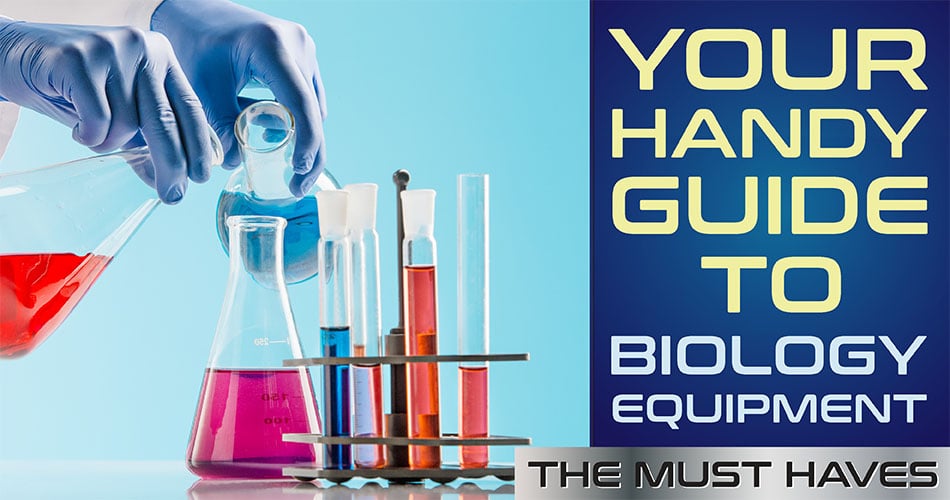
A bio lab is not complete without this list of Biology equipment!
In Biology, we explore cells & tissues of plants and animals through a microscope. But there is more to have than just this eyepiece instrument.
There are all types of equipment you can find in a laboratory environment. Even so, when building a biology lab, you will need a specific set of tools for a certain study.
Here, we have put together the essential biology equipment. We focused more on the major bio lab tools—items that are crucial to a foundation of a great laboratory.
Check them out to complete your list!
First Things First: Safety
Working in the lab means the risk of exposure to hazardous chemical substances is higher. Thus, wearing proper PPE and following the right safety protocols is crucial.
Having a fire extinguisher and fire blanket on hand is also an advantage. These are especially important when working with Bunsen burners or flammable chemicals.
Simply put, every scientist should wear a lab coat, gloves and protective eyewear. This includes students performing experiments at home or school. Otherwise, any spill or splash could result in an injury.
The Must-Have Biology Equipment
1. Microscopes
They say no biology class is complete without using microscopes—and we could not agree more. A powerful tool which allows students and scientists to see and study organisms closer.
Even the smallest parts of a cell seem clear with a microscope. This includes microorganisms and the minute structures of plants, animals, and fungi.
But a microscope needs accessories to cater to specimen requirements. Whatever the sample is, you will also need these:
- Slides. A thin flat piece of glass is used to hold objects for examination. Generally, slides are made from optical glass-like borosilicate or soda-lime glass. They are suitable for the samples we mentioned, as long as they are small and flat enough to fit on the slide.
- Test tubes. Glass containers that hold chemicals during experiments. If the sample needs to be centrifuged, a test tube comes in handy.
- Petri dishes. Shallow round glasses that come in a cylindrical shape. To culture a sample, a petri dish containing a culture medium is smeared and pressed onto the medium. This includes cells, viruses, bacteria, and other microorganisms.
Check out our available microscopes in the Biology field.
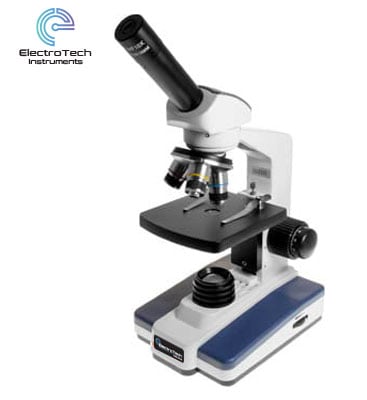
Microscope Biological Monocular, 40x – 400x, LED Illumination
Product code: MS1020A
A popular entry-level biological microscope used for observing microorganisms and their features. It features adjustable brightness, coarse and fine focus. Ideal for viewing prepared slides of biological cells, bacteria as well as living tissue cultures.
You might also like the Monocular Biological Microscope, 40x – 1000x, LED Illumination (MS1035A). It features an integrated X-Y mechanical stage and an Abbe N.A. 1.25 condenser. The built-in rechargeable batteries enable cordless operation.
2. Beakers, flasks, and Bunsen burners
Mixing solutions and chemicals are also part of a biologist’s job. Beakers, flasks and Bunsen burners are common in a chemistry lab but are also often seen in a bio lab.
- Beakers. Cylindrical containers used for storing, mixing and holding liquid or solid samples. Beakers are also helpful for catching liquids from filtering operations.
- Flasks. Lab essentials that are usually made of glass. Ideal for making solutions or for holding or measuring chemicals and samples.
- Bunsen burners. Heat sources; cylinders attached to a gas line. They can provide a single, continuous flame by mixing gas with air in a controlled manner.
Check below our top-selling beakers, flask kit and Bunsen burner.

Glass Beaker – GG17 Clear Borosilicate, Low Form with Graduations
Product code: LG1101
Premium quality laboratory glass beaker, made of Borosilicate glass. These have a very low coefficient of thermal expansion, thus making them resistant to shock.
Available sizes: 25ml, 50ml, 100ml, 250ml, 400ml, 500ml, 800ml, 1000ml, 2000ml, 3000ml, 5000ml.
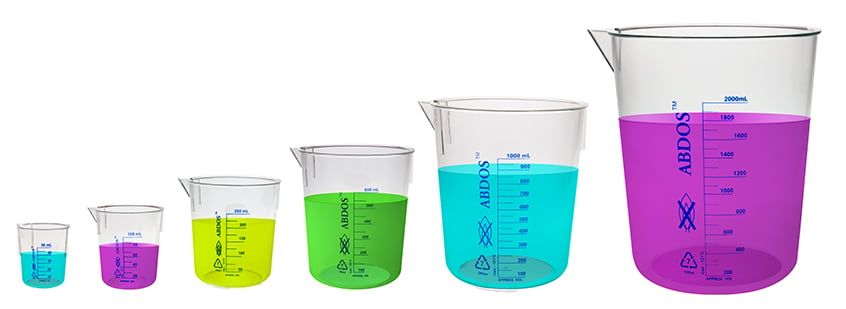
Graduated Beaker – Abdos TPX™ (Polymethylpentene), Low Form
Product code: LP1101TPX
Low form graduated beaker with blue graduations for science lab experiments and chemistry. Made from TPX™ plastic (Polymethylpentene or PMP).
The material is a transparent glass-like plastic with excellent optical clarity. This makes it perfect for autoclavable medical and laboratory equipment. These PMP beakers are high quality and fully autoclavable.
Available sizes: 50ml, 100ml, 250ml, 600ml,1000ml, 2000ml, 2 x 6 size set.
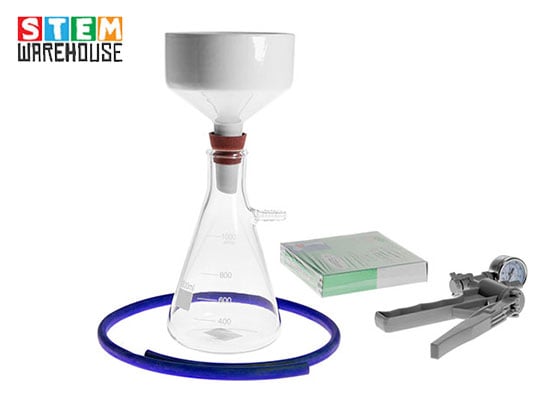
Filter Flask Kit
Product code: LC1501-125
A flask kit that contains high quality, compatible products. It comes with:
- Erlenmeyer Side Arm Filtering Flask 1000ml
- Porcelain Buchner Filter Funnel 125mm
- Rubber Stopper with Hole #17
- LH2172-SR Blue Silicone Tubing
- Manual Vacuum Pump with Gauge
- Filter Paper 125mm – 100pk
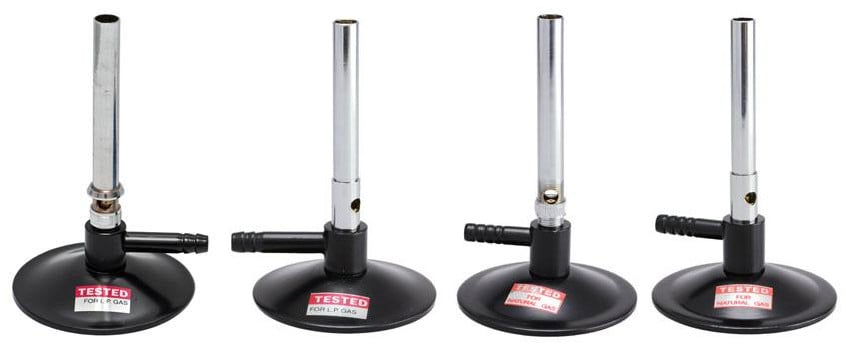
Bunsen Burner
Product code: LH00x0
Ideal for chemistry and biology experiments. Inexpensive and designed to be long lasting for classroom and science laboratory use.
It features a ribbed gas inlet and a wide, flat base for stability. Available in LPG and Natural Gas versions, and also with slide or screw adjustment.
3. Hot plate
One of the vital lab tools for heating samples at a precise temperature. Hot plates feature a flat surface with heating elements.
They do not produce open flames, making them well suited for oil or sand bath use. You can use glass beakers, flasks, vials—mostly glassware to heat samples using a hot plate.
Moreover, some models come with a magnetic stirrer, which stirs the heated liquid automatically. This feature also helps slow down the rate of heat exchange, allowing for even heating of the content.
High-quality and powerful magnetic stirrers & hot plates are also available on our website! You might like what we have to offer below:
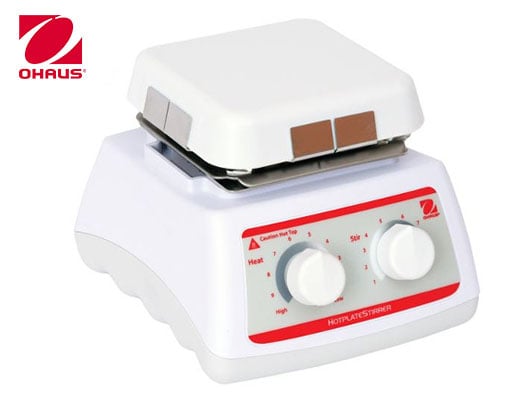
Mini Hotplate Stirrer OHAUS
Product code: LQ2074
A mini hot plate unit that can heat and stir up to 1000 ml of liquid/sample. Ideal for educational and other lab environments that require heating and consistent stirring.
It also features a 102 x 102 mm, easy-to-clean ceramic top plate and cool-touch housing.
4. Forceps, probes, and scalpels
Dissection is an instructive aspect of the biology curriculum. At school levels, students may also be instructed to bring their own dissecting tool kit.
In a kit, forceps, probes and scalpels are commonly used to perform a dissection.
- Scalpel. A small and sharp bladed tool used for anatomical dissection and surgery. Scalpels may be single-use disposable or re-usable. Anyhow, they can split open skin and cut through muscle and organs—thus, ideal for dissecting.
- Forceps. Small yet helpful tools when it comes to picking tiny or delicate objects. This also includes holding tissue out of the way or picking up a structure. Most are made of stainless steel.
- Probes. Tools that make spectroscopy more flexible and easier to handle. They are usually 6” long needles inserted into a small, wooden handle. Probes are also great for separating specimens and exploring dissected animals.
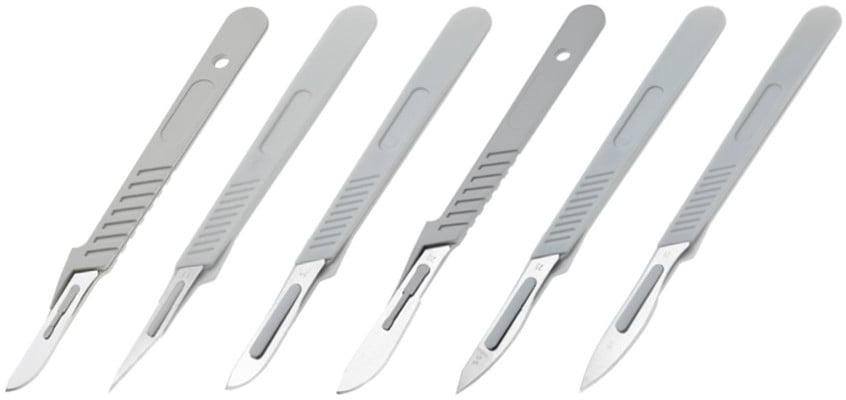
Sterile Disposable Scalpels
Product code: TL1535
A 10-pack of sterile scalpels perfect for both student and professional use in the lab. Blade types available: #10, #11, #20, #22, #23, #24.

Stainless Steel Forceps Set of 4
Product code: TL1429
A set of 4 stainless steel forceps. Constructed from stainless steel, ideal for student and professional use in the laboratory.
5. Electronic balance
A device used to measure chemicals accurately, an electronic balance provides a digital result of measurement.
This instrument is ideal for measuring solids, liquids, and tissue. It also comes in handy in clinical, research and environmental settings.
Here, we offer a wide range of Ohaus Electronic Balances in different series. Listed below are a few of our best picks!
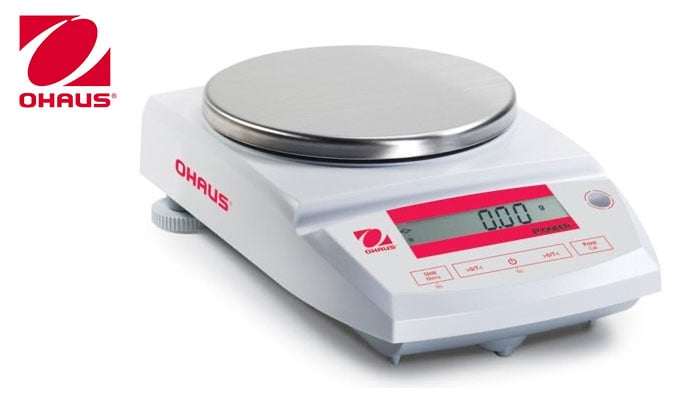
OHAUS PX4201 – Pioneer Precision Balance 4200 x 0.1g
Product code: ME484201
Designed for adaptable and long-term use. It features a cast metal base and a removable stainless steel pan.
This electronic balance also combines important weighing usability with competitive performance. It provides high precision and repeatability for important weighing applications in the laboratory. The Ohaus Pioneer range is also available in versions with different capacity / readability.
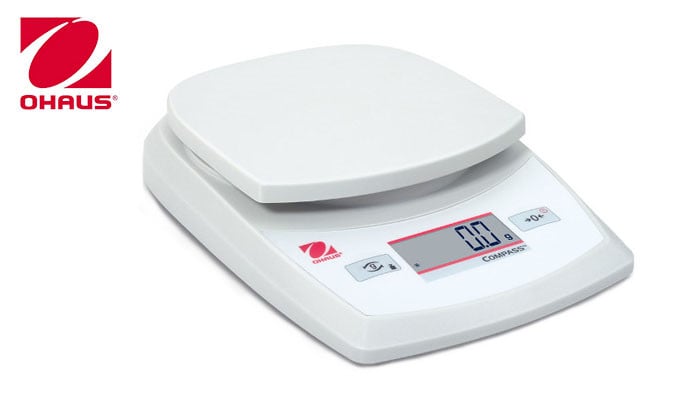
Ohaus CR5200 – Compact Scale 5200 x 1.0gm ABS Compass
Product code: ME4636
Lightweight and easy to carry unit that provides competitive performance. It also features a stackable design with an expanded weighing platform.
This CR series is ideal for a wide range of portable weighing applications. Economical balance with a stylish compact design and good performance. It has all the features you need to satisfy your basic weighing requirements! The Ohaus CR range is also available in different capacity / readability.
Ohaus CS2000 – Compact Scale 2000x1g – No longer available
Product code: ME4642
A compact digital scale that provides portability. The OHAUS CS2000 gives a weighing capacity of 2000 grams with an accuracy of 1 gram.
It is battery powered or AC powered with an auto shut off feature. Also available: Ohaus CS200 Scale – Compact Scale 200 x 0.1g (ME4640) – No longer available.
6. Evaporating dish
Laboratory glassware used for the evaporation of solutions and supernatant liquids. The evaporating dish is a small bowl with a spout made of porcelain or borosilicate glass.
Evaporating dishes in the bio lab usually accommodate small samples. Bigger samples can be catered to using larger dishes. They are less shallow and more hemispherical to do the job.
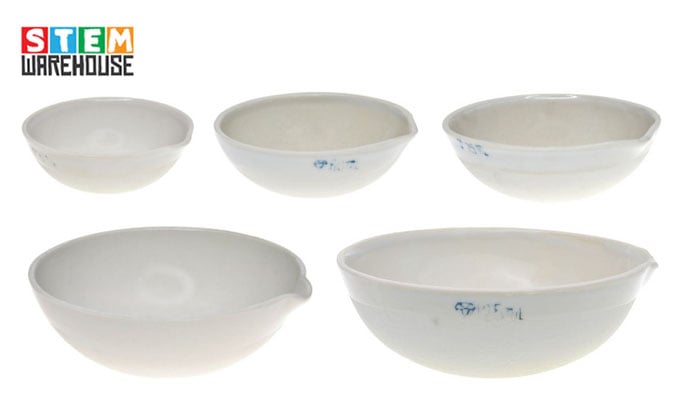
Porcelain Evaporating Dish Round Bottom
Product code: LC1171
Ideal for evaporating solvents to leave behind a concentrated solution. Best used with a Bunsen burner to expedite the evaporation process.
Other features include:
- Spout for easy pouring
- Made from high-quality porcelain
- Round bottom
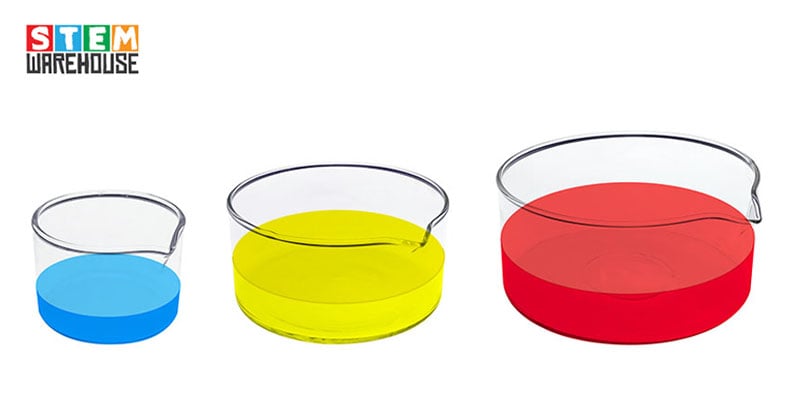
Crystallising Dish
Product code: LG1173
A cylindrical clear glass crystallising dish with a spout. Designed to facilitate slow evaporation, leaving behind solid crystals.
Available in 60mm, 100mm and 150mm diameters.
7. Test tubes and racks
Test tubes are cylindrical pipes made up of glass. Ideal for storing and mixing reagents in chemical or biological reactions.
They have a circular opening on one side and a rounded bottom. They also come in handy when many samples need to be tested for qualitative assessment.
Meanwhile, test tube racks, as the name implies, hold the test tubes in place.
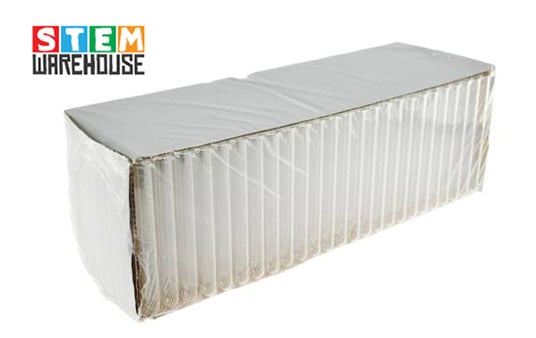
Glass Test Tubes – Borosilicate, Rimless
Product code: LG1231
High-quality and have very low coefficients of thermal expansion. This makes them more resistant to thermal shock than other types of glass.
Further, they are clear enough to see the reactions or processes occurring within the test tubes. Available in different sizes and pack sizes:
- 12×75mm – Pack of 100 (LG1231-1/100)
- 12×75mm – Pack of 250 (LG1231-3)
- 12×100mm – Pack of 250 (LG1231-2)
- 16×150mm – Pack of 100 (LG1231-5/PK100)
- 25×150mm – Pack of 100 (LG1231-7/PK100)
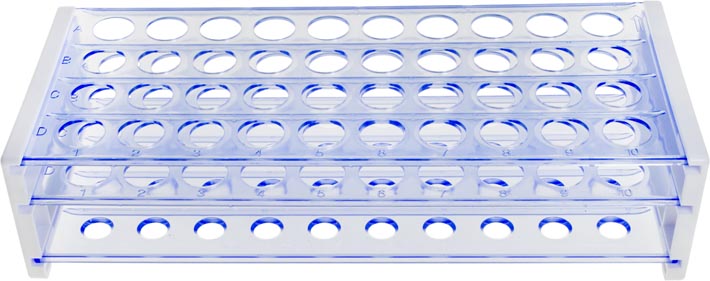
Polypropylene Test Tube Rack – 40 x 16mm Tubes (4×10)
Product code: LH6816
These test tube racks are heavy duty and join together in a 5-piece design, featuring 40 holes. Constructed from polypropylene, they are fully chemical resistant.
8. Safety apparatus
As mentioned, the safety of people handling experiments in a lab is more important than ever. The essential safety apparatus consists of safety goggles, a lab apron, and latex gloves. Appropriate shoes are also a must; any sandals or slippers should not be worn in the laboratory.
- Safety glasses. They protect us from eye irritation that may arise from any chemical or fumes present there. Safety goggles also act as a shield, preventing any particles from entering your eyes.
- Lab coats. Wearing one helps prevent liquid and dangerous chemicals from coming into contact with your skin. It also protects your clothes while working in a lab.
- Protective gloves. Your hands are likely to be more at risk for contact with hazardous chemicals. By wearing protective gloves, you can reduce your risk of injury. Gloves are important, especially when doing blood analysis or working around contaminated surfaces.
The Bottom Line
Other than these, you will also see accessories such as thermometers, stirring rods, Litmus papers, etc. But the ones in our list are the basics, and you must get familiar with them when building your own bio lab.
We also have created an in-depth list of the best science lab equipment, so make sure to check it out next!
© Electrotech Brands Pty Ltd 2021


Write a Comment
You must be logged in to post a comment.